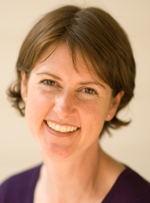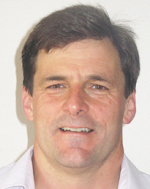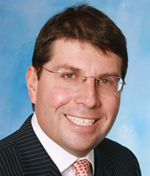One Just World forum: Carbon Trading Exposed: the impact on the world's poor
Thursday 25 June 2009
Adelaide Town Hall
Jointly-presented by World Vision Australia, AusAID, International Women's Development Agency
and supported by The Bob Hawke Prime Ministerial Centre at UniSA
Audio transcript available here
The devastating effects of climate change are already a reality for many communities across the globe. Climate change has been called the greatest long-term threat that humanity faces. Left unabated, it will impact on everyone, and most significantly on the world's poor who are least responsible for the problem.
There is growing international support for the reduction of greenhouse gas emissions. The question is whether the introduction of carbon trading schemes is part of the solution. Australia is developing an emissions trading scheme. Schemes are already operating in 27 European countries. Twenty-eight states and provinces in the US and Canada are introducing emissions trading, as is New Zealand. Japan is considering introducing a scheme.
This forum will explore answers to questions including:
- What will be the impact of carbon trading on the world's poor?
- What will its effect be on women in developing countries?
- Can carbon trading schemes be established to help poor communities overcome poverty?
- What roles do business, government, non-government organisations and individuals have to play?
Speakers:
- Mr Murray Proctor, Deputy Director General of the Program Enabling Division, AusAID
- Ms April Allderdice, CEO, MicroEnergy Credits, USA
- Mr Martijn Wilder, Partner and Head Global Climate Change Team, Baker & McKenzie
- Professor Stephen Howes, Crawford School of Economics and Government, The Australian National University
Chair: Professor Caroline McMillen, Deputy Vice Chancellor & Vice President: Research & Innovation, University of South Australia and Member of the Premier's Climate Change Council
Biographies:
Murray Proctor, Deputy Director General of the Program Enabling Division, AusAID
Murray Proctor has more than 25 years experience in aid and development. His current role is Deputy Director General of the Program Enabling Division at Australia's Agency for International Development (AusAID). This Division provides advice to AusAID program areas on sectors such as the environment, education, health, and infrastructure. Concurrently, Murray commenced duties as Australian Ambassador, HIV/AIDS on 1 December 2007. The role of the HIV/AIDS Ambassador is to encourage political, business and community leaders in the Asian Pacific region to provide the direction and support needed to halt the spread of HIV/AIDS and reduce the suffering it causes. Murray was previously Deputy Director General of AusAID's Asia Division, and before that managed the AusAID Office of Review and Evaluation and Australia's aid program to PNG. He worked from 1999 to 2001 in the World Bank on East Timor reconstruction and public sector reform. He holds degrees in Psychology and Economics from the University of Queensland and Australian National University respectively.
 April Allderdice is the co-founder and CEO of MicroEnergy Credits. MicroEnergy Credits provides the missing link connecting the carbon markets and the growing microfinance market in developing countries. Using internet and mobile phone technology MicroEnergy Credits aggregates carbon offsets from the clients of Microfinance Institutions and sells them to the carbon markets, enabling better and cleaner energy choices for the market at the bottom of the pyramid. MicroEnergy Credits won the 2008 Global Social Venture Competition for a business model that is "Game Changing" for the poorest. April is an alumni of McKinsey and Company, the National Renewable Energy Laboratory, Columbia Business School and Wesleyan University. She was also a founding member of Grameen Shakti, the renewable energy business of Grameen Bank in Bangladesh, which has enabled 650,000 people to light their houses, schools and businesses with solar energy.
April Allderdice is the co-founder and CEO of MicroEnergy Credits. MicroEnergy Credits provides the missing link connecting the carbon markets and the growing microfinance market in developing countries. Using internet and mobile phone technology MicroEnergy Credits aggregates carbon offsets from the clients of Microfinance Institutions and sells them to the carbon markets, enabling better and cleaner energy choices for the market at the bottom of the pyramid. MicroEnergy Credits won the 2008 Global Social Venture Competition for a business model that is "Game Changing" for the poorest. April is an alumni of McKinsey and Company, the National Renewable Energy Laboratory, Columbia Business School and Wesleyan University. She was also a founding member of Grameen Shakti, the renewable energy business of Grameen Bank in Bangladesh, which has enabled 650,000 people to light their houses, schools and businesses with solar energy.
April Allderdice has devoted the last decade to changing energy consumption behaviours at a grassroots level. In the late 1990s, Allderdice helped initiate a revolutionary enterprise at Grameen Shakti, a sister bank of the Grameen Bank. The venture was aimed at promoting and incentivizing clean energy alternatives for some of the poorest people on the planet. Microloans for the "green" energy alternatives, such as solar-panels, were marketed to customers to use in their homes and small businesses. The plan worked, and to date the bank has sold over 240,000 solar home systems to its customers in Bangladesh, and is now expanding into biogas digesters and improved cookstoves.
Allderdice saw the potential MFIs offered to radically change energy usage habits from the bottom up, and with the help of fellow Grameen employee James Dailey, they decided to take the idea to a global level. Thus, MEC was born. By using internet and mobile phone technology, MEC aggregates carbon offsets from the clients of Microfinance Institutions (MFIs) and sells them to the carbon markets, enabling better and cleaner energy choices for the market at the bottom of the pyramid. MEC is now the recognized leader in solutions-based carbon trading market.
MEC continues to rapidly expand its partnerships with MFIs and banks throughout the world. Most recently, Hong Kong and Shanghai Bank Corp. (HSBC) and Aryavart Gramin Bank (AGB) have agreed to begin work with MEC. And new projects, like with FINCA Uganda and Spandana MFI, have the potential to replicate the successes of Grameen. Spandana, India's second largest MF, just closed out a very substantial round of funding and is looking to expand their existing 2.5 million client base. Through the promotion of a simple solar lantern, Spandana and MEC have the ability to reach an unparalleled group of customers and reduce their carbon footprint. MEC and FINCA Uganda are looking to duplicate this model as well. By scaling up marketing efforts and providing the necessary technical support in East Africa, MEC can help produce the same kind of results achieved in India.
 Professor Stephen Howes is at the Crawford School of Economics and Government at the Australian National University. In 2008, he worked on the Garnaut Climate Change Review. Prior to that, he was Chief Economist with the Australian Agency for International Development (AusAID). From 1994-2005, he was at the World Bank, most recently as Lead Economist for India, based in Delhi. Professor Howes has a PhD in Economics from the London School of Economics, and has conducted extensive research over the last 20 years into the economies of the Asia-Pacific region.
Professor Stephen Howes is at the Crawford School of Economics and Government at the Australian National University. In 2008, he worked on the Garnaut Climate Change Review. Prior to that, he was Chief Economist with the Australian Agency for International Development (AusAID). From 1994-2005, he was at the World Bank, most recently as Lead Economist for India, based in Delhi. Professor Howes has a PhD in Economics from the London School of Economics, and has conducted extensive research over the last 20 years into the economies of the Asia-Pacific region.
 Martijn Wilder heads Baker & McKenzie's Global Climate Change and Emissions Trading Practice and is an Adjunct Professor of Climate Change Law and Policy at the Australian National University. He is regarded as one of the leading legal advisors in the world having worked in the area for over 10 years. He advises numerous governments and international agencies (including UNDP and UNEP) and multi-lateral banks such as the World Bank and the Asian Development Bank on the development and implementation of climate change and emissions trading policies and programmes. He also works with an international client base on international carbon transactions on a daily basis. Martijn is also Chair of the NSW Climate Change Council, Chair of NSW Government Carbon Trading Hub Taskforce, on the advisory board of the Voluntary Carbon Scheme Agriculture, Forestry and other Land Use (AFOLU) Standard on the Governing Board of the UK Government's Renewable Energy and Energy Efficiency Partnership (REEEP), Chair of TRAFFIC (Oceania) and a Governor of WWF. He is on a founder of, and on the Advisory Board of the Renewable Energy and International Law Project (REILP). Martijn has honours degrees in Economics (Sydney) and Law (ANU) and was a Cambridge Commonwealth Trust Scholar where he obtained an LLM. He has published widely in the international law and climate change area.
Martijn Wilder heads Baker & McKenzie's Global Climate Change and Emissions Trading Practice and is an Adjunct Professor of Climate Change Law and Policy at the Australian National University. He is regarded as one of the leading legal advisors in the world having worked in the area for over 10 years. He advises numerous governments and international agencies (including UNDP and UNEP) and multi-lateral banks such as the World Bank and the Asian Development Bank on the development and implementation of climate change and emissions trading policies and programmes. He also works with an international client base on international carbon transactions on a daily basis. Martijn is also Chair of the NSW Climate Change Council, Chair of NSW Government Carbon Trading Hub Taskforce, on the advisory board of the Voluntary Carbon Scheme Agriculture, Forestry and other Land Use (AFOLU) Standard on the Governing Board of the UK Government's Renewable Energy and Energy Efficiency Partnership (REEEP), Chair of TRAFFIC (Oceania) and a Governor of WWF. He is on a founder of, and on the Advisory Board of the Renewable Energy and International Law Project (REILP). Martijn has honours degrees in Economics (Sydney) and Law (ANU) and was a Cambridge Commonwealth Trust Scholar where he obtained an LLM. He has published widely in the international law and climate change area.
Information on the One Just World series may be found on their web site.
 |
 |
 |
 |
While the views presented by speakers within the Hawke Centre public program are their own and are not necessarily those of either the University of South Australia or The Hawke Centre, they are presented in the interest of open debate and discussion in the community and reflect our themes of: strengthening our democracy - valuing our cultural diversity - and building our future.



